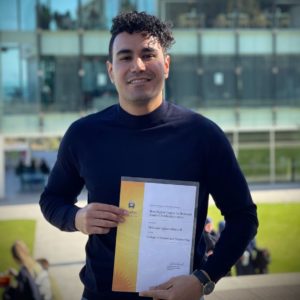 PhD student, college of Science and Engineering, Mehrdad Aghamohamadi, conducting research in renewable and sustainable power and energy systems.
PhD student, college of Science and Engineering, Mehrdad Aghamohamadi, conducting research in renewable and sustainable power and energy systems.
Born in Sabzevar, a tiny town on the northern east of Iran. As a kid, I was always trying to build something out of anything useless. Once I made a helicopter out of a piece of Styrofoam with a tiny electric motor and it actually flew, I guess this was the start of my engineering life.
I studied electrician diploma in a vocational school (something like TAFE in Australia). After graduation, I started College straight away and graduated as an electrical engineer after four years of study towards an undergraduate degree. I was working as an electrician the whole time, even during my master’s degree which helped me a lot in understanding electrical engineering concepts in both academic and practical aspects. My focus during master’s degree was on renewable energy development and battery energy management in electricity distribution system.
After my master’s degree I decided to apply for a PhD program in Australia. After a considerable time spent on decision making, I decided to choose Flinders University. I started my PhD study in March 2019 under an AGRTP (Australian Government Research Training Program) scholarship. The first year of my study was incredibly productive. I published 5 research papers and I was awarded the “2019 Chris Marlin Postgraduate Publication of the Year Award” for one of my publications in the Energy Journal in that year. Moreover, I secured a top-up scholarship from CSIRO (Commonwealth Scientific and Industrial Research Organization) with a value of $45,000 AUD.
At that time, I was feeling overwhelmed by joy and appreciation as I had chosen Flinders University for its well-known industry collaborations, and it perfectly happened as expected. Due to my collaboration with CSIRO, I am conducting a project which investigates the effects of electric vehicle employment on electricity distribution system at the presence of renewables and large-scale battery systems, which is also my thesis topic. In addition, I was one of the six finalists of the Pitch Competition in Bridgestone World Solar Challenge 2019 among 43 teams from different universities all around the world. I represented Flinders Automotive Solar Team (FAST) in this competition.
The second year of my study at Flinders University kicked off even stronger as I published two high quality papers in the journal of IEEE Transactions on Industrial informatics and the journal of IEEE Transactions on Industry Applications. These publications resulted in two other high prestigious awards at Flinders University in 2020. Accordingly, I was awarded the “2020 Chris Marlin Postgraduate Publication of the Year Award” for the second time as well as the “2020 Best HDR Student Publication of the Year Award”. These awards are highly competitive among the university and I am honoured and humbled for receiving them. I also published 9 other papers in prestigious international journals and conferences which are based on the obtained results of my study at Flinders University.
My research includes the optimal integration of electric vehicles into renewable energy-integrated electric power systems. In this regard, I specifically analyse the energy management and planning approaches for the integration of renewable sources of energies (solar farms and wind units), energy storage units (electrical batteries, and mechanical storage), as well as electric vehicles into distribution level. I provide operational research and possible applications for electrical & energy companies by employing advanced simulation software and optimization algorithms. These services include the design and analysis of renewable sources and storage units for residential, distribution, and energy generation sectors. I am also conducting research on uncertainty characterization for the volatile nature of renewable energy sources, which can pose a noticeable effect on the optimal operation of the distribution system. In particular, I analyse the uncertainties through robust optimization and stochastic programming. Moreover, I am conducting novel research on more practical robust optimization approaches to handle the uncertainties in a more efficient and practical way in the distribution system. Demand response management and provision of some programs for electric consumers to increase the profit of the electricity companies in the market are among other topics which I am highly focusing on during recent years. These programs encourage consumers toward renewable energies as well as new types of energy storage units.
I would like to thank my supervisory team Dr Amin Mahmoudi, Dr Mohammed Haque, and Dr John Ward. I would also like to thank my colleagues as well as Flinders University for the great support and services, especially for higher degree by research students.

